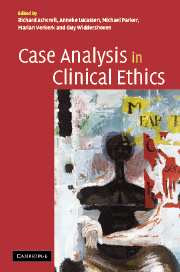Book contents
- Frontmatter
- Contents
- Notes on contributors
- Acknowledgements
- 1 Philosophical introduction: case analysis in clinical ethics
- 2 Families and genetic testing: the case of Jane and Phyllis
- 3 Family access to shared genetic information: an analysis of the narrative
- 4 A virtue-ethics approach
- 5 Interpretation and dialogue in hermeneutic ethics
- 6 ‘Power, corruption and lies’: ethics and power
- 7 Reading the genes
- 8 A utilitarian approach
- 9 A feminist care-ethics approach to genetics
- 10 A conversational approach to the ethics of genetic testing
- 11 Families and genetic testing: the case of Jane and Phyllis from a four-principles perspective
- 12 A phenomenological approach to bioethics
- 13 An empirical approach
- 14 Response to ethical dissections of the case
- 15 Philosophical reflections
- Index
- References
6 - ‘Power, corruption and lies’: ethics and power
Published online by Cambridge University Press: 01 September 2009
- Frontmatter
- Contents
- Notes on contributors
- Acknowledgements
- 1 Philosophical introduction: case analysis in clinical ethics
- 2 Families and genetic testing: the case of Jane and Phyllis
- 3 Family access to shared genetic information: an analysis of the narrative
- 4 A virtue-ethics approach
- 5 Interpretation and dialogue in hermeneutic ethics
- 6 ‘Power, corruption and lies’: ethics and power
- 7 Reading the genes
- 8 A utilitarian approach
- 9 A feminist care-ethics approach to genetics
- 10 A conversational approach to the ethics of genetic testing
- 11 Families and genetic testing: the case of Jane and Phyllis from a four-principles perspective
- 12 A phenomenological approach to bioethics
- 13 An empirical approach
- 14 Response to ethical dissections of the case
- 15 Philosophical reflections
- Index
- References
Summary
The standard approach to medical ethical analysis of problematic situations, such as the one concerning Jane, Phyllis and the various medical practitioners in this case, is to identify the ‘ethical issues’ that the case involves, and then to apply principle- or consequence-based techniques of analysis and arguments to offer some kind of resolution of these issues. Taking this approach, we could, for instance, start by noting the centrality of confidentiality in this narrative. We would seek to analyse the concept of confidentiality in the hope that this would enable us to understand what the limits of the concept are, and to draw inferences about when breach of confidence might be justified or even required, and when alternative principles (such as a duty to minimise preventable harm to others) might be said properly to override an individual's preference that some information about them be held confidentially.
A second feature of the standard approach to medical ethical case analysis is that we are primarily concerned with right action (what should I do?), and in particular right action by a specific actor or set of actors – the medical professionals involved in the situation. (The same goes for nursing ethics and nurses, or counselling ethics and counsellors, for instance).
This approach has been highly productive in both assisting clinicians to deal with ethical and practical problems, and in the intellectual development of medical ethics.
- Type
- Chapter
- Information
- Case Analysis in Clinical Ethics , pp. 77 - 94Publisher: Cambridge University PressPrint publication year: 2005
References
- 3
- Cited by



